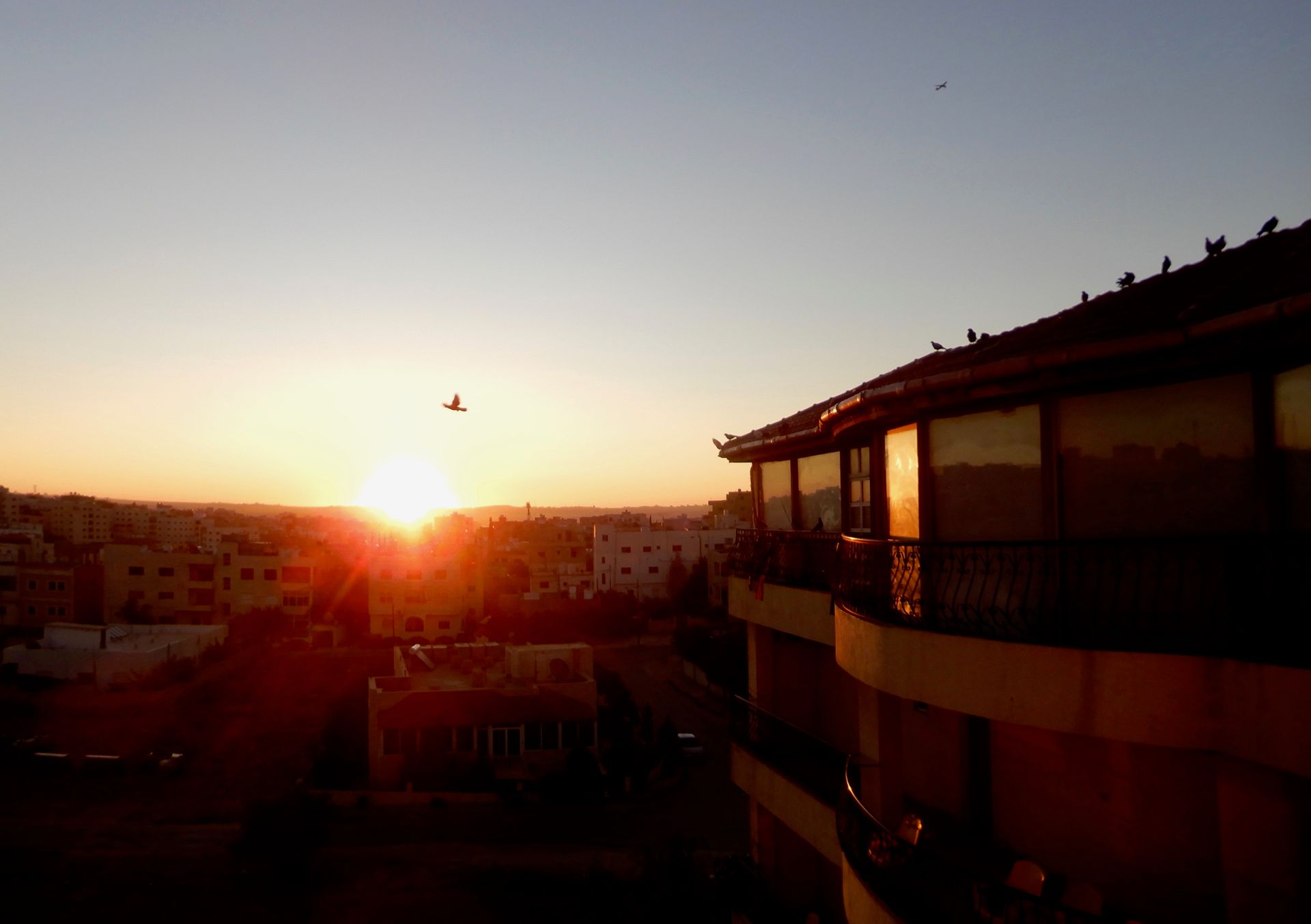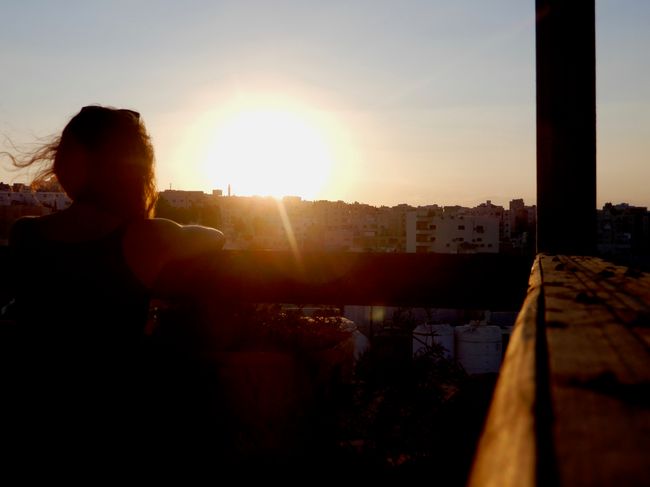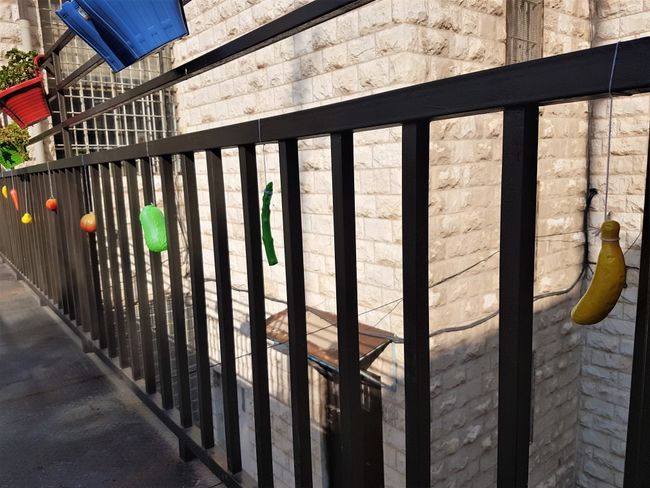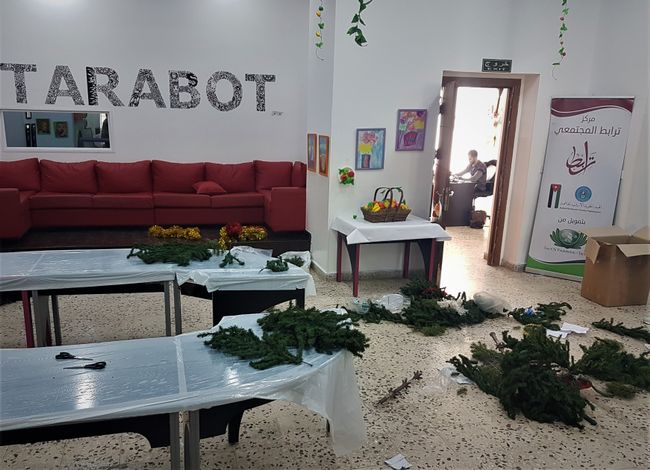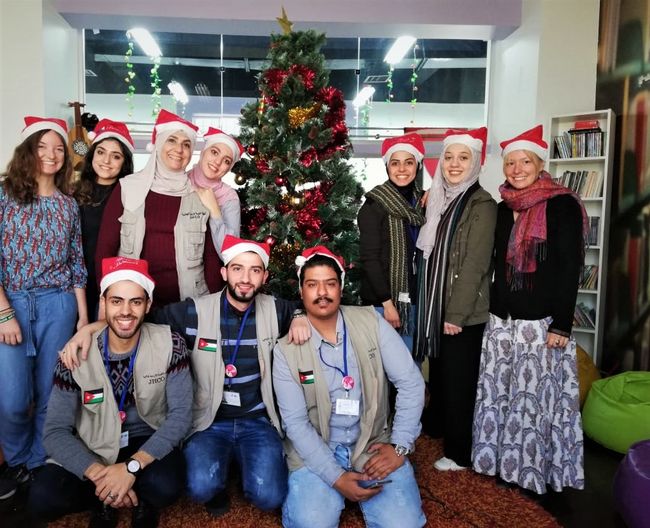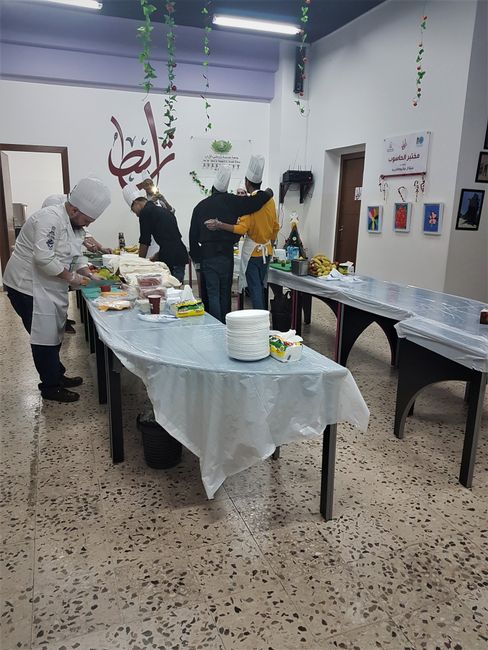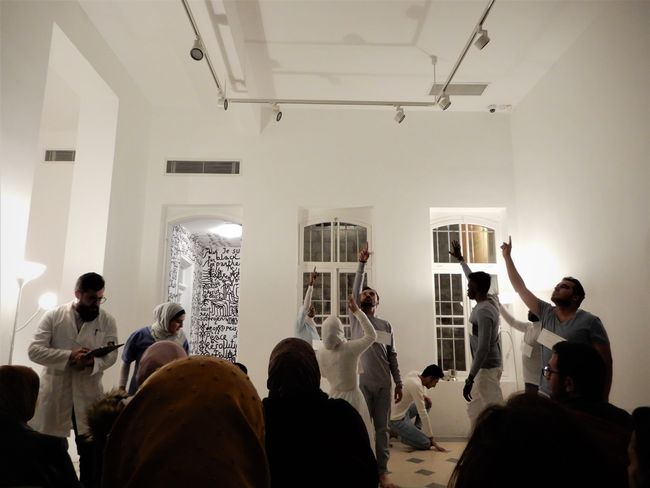Child Chef Day
வெளியிடப்பட்டது: 06.12.2019
செய்திமடலுக்கு சந்தாதராகவும்
Child Chef Day
Wednesday + Thursday, December 4 + 5
8 am. Today, as I head to Tarabot, I wear my only jacket for the first time – it has gotten quite chilly lately when the sun isn't shining. Sophia and I are teaching our fourth English class today – we originally agreed to teach 5 units, so we have a bit more time than expected to teach the children the language.
Samer, our translation assistant, is not here today, but the two troublemakers from last week are. We now realize that Samer is not only important as a translator but also as a calming presence. Amer, who is helping us today, is doing a good job as well, but overall, we feel less in control of the restless moments in the classroom. One method we have observed several times in various workshops here at Tarabot is that a supervisor shouts "Eeeeeeehe!" very loudly, to which the group of children automatically responds with "Oooooooho!" This is supposed to get the children's attention back. Sophia tries it, and it works quite well, but only for a short moment. Despite the challenges, we push through and manage to cover our planned material: time, colors, and the animal world.
It is quiet this afternoon. Tomorrow, Tarabot is hosting the "Child Chef Day," which requires some decoration and preparation. Mohammed Lafi, a well-known TV chef in Jordan (who turns out to be Kemo's cousin, the one who organized the event), will be cooking with a group of children. Our colleagues start decorating all the Tarabot spaces with plastic vegetable and fruit garlands. Sophia and I initially thought it was Christmas decorations and were glad to be corrected. Anyway, it seems like a big event.
The sun is back as we head back, warming our heads pleasantly. The rest of the day is dedicated to university stuff and Arabic with Rose. The usual.
9 am. When I arrive at Tarabot this morning, the vegetable and fruit decorations have multiplied exponentially. In the main hall, two long rows of tables are already prepared with plastic wrap, where the food will be prepared later. Amer is busy pouring plastic Christmas tree branches from a multitude of boxes into a pile. "Can you help me?" he asks. "You know how to do this, right?" I tell him that we have real Christmas trees in Germany, not made of plastic. "But you are in Jordan now!" is his accusatory response.
Alright then. I try to bring order to the chaos, but it turns out to be more difficult than I thought. I eventually understand that there are three different plastic trees here, some of which are incomplete and slightly broken. Ibrahim, who works as a driver at Tarabot, joins the Christmas tree project and sticks a small branch to a pole that clearly belongs to a different tree. "Happy Christmas!"
"Sophia, help me!" I am relieved when she enters the room shortly after. The five of us eventually manage to find a tree that is relatively complete, and with teamwork, we create something resembling a pine tree. Including pine cones and artificial snow sprayed on the plastic needles. "Wow. This is the ugliest Christmas tree I have ever seen," Sophia blurts out in the end. Fortunately, she says it in German – our Tarabot colleagues are still unsure about any Christmas decorations and keep asking Sophia and me for advice. When we manage to artfully wrap a string of lights around the branches and Mahmoud plugs the lights into the socket, Sophia and I instinctively cover our mouths with our hands. It is a red string of lights that blinks. We didn't expect that even on this plastic tree. "What’s wrong?" Hana’a asks, surprised by our reaction. "You don’t have that in Germany?". We try to explain to her that we do have Christmas trees, but they are a bit different from this one. "But is it fine like that?" she asks, concerned. Ya, sure. It’s fine.
So we try to salvage what we can with red and golden tinsel and plastic balls, and manage to turn off the blinking lights. In the end, we have made the best of the given circumstances. Our Tarabot colleagues are definitely excited, and there is now a photo session with the whole team in front of the plastic tree. It is a really bizarre situation, with all of us posing in front of the red-gold tree wearing Santa hats (the girls wearing them over their hijabs). But it's also quite funny. And that's the main thing.
At around 12 o'clock, the team from Mohammed Lafi arrives with ingredients and equipment and starts setting everything up. In a side room, there is a muffin station, and on the long tables in the middle, there are areas for fruit salad, sandwiches, smoothies, and crepes. Then, we wait. Sophia and I are already getting hungry and quietly make a detour to Abu Wahid – if anyone here were to find out, we would hear a lot of complaints again.
The event was supposed to start at 2 o'clock, but it's already half past 2 when a few kids arrive, who also usually come for the afternoon care. They are divided into two rows outside the entrance (of course, girls and boys separated), and their attendance is checked. In the end, there are 45 children. And we are still waiting for the bus that will bring about 50 more children for this event. We are already wondering how it will all fit in the limited space.
At around 3 o'clock, it finally begins: a total of about 100 children walk in a line into the prepared room. And it is really packed. In the midst of the loud group of children, you can occasionally spot the white chef hats of Mohammed Lafi's team, which creates a really funny picture. Mohammed greets the group of children with a microphone but struggles to keep their attention. We can already imagine the chaos that will ensue. First, a hygiene training is shown on a projector and screen, and then it starts.
First, all the children are equipped with blue hairnets, disposable plastic aprons, and gloves. Obviously, all in adult size, which makes the smaller children look really funny and they have to be careful not to trip over their aprons while walking. A small mouse extends her tiny hand to me, offering a plastic glove, but it is almost impossible for her miniature hands to fit into the fingers of the large gloves. Mohammed Lafi had explained to me earlier that they want to form 5 groups of 20 children each, and each group will take turns at each station to work and eat. It was clear from the beginning that this wouldn't work in this small space.
As expected, chaos breaks out for about an hour and a half. The capacities at each cooking station are limited, even though Mohammed's team is doing their best to serve all the children. I am sure they didn't expect such a surge. Whenever something edible is ready at a station, a chaotic mass of arms reaches out from all sides, combined with corresponding shouting. The rush at the crepe station is the biggest – understandable, given the amount of chocolate sauce that drowns each crepe. No one from the Tarabot team has control over the number of children: some with completely chocolate-covered faces, some almost immobile under the oversized plastic attire, some crying and frustrated because they haven't received any food yet, while others manage to grab a crepe for the third time. It is truly complete anarchy, like nothing I have ever experienced. I think everyone underestimated what it means to prepare food for 100 children at the same time.
By half past 4, it is finally over – the room slowly empties, and the children go home. Abdullah, another driver from Tarabot, who helped at the crepe station, distributes the remaining chocolate sauce as a snack in cups. I don't even try to explain to him that I think it's not a good idea. Then, a big cleanup follows – fortunately, with many helping hands. In the end, most of the children are very happy and satisfied with their full stomachs and the leftover food they can take home. However, a bit more organization for the next big event probably wouldn't hurt.
Another event takes place tonight, which I have been looking forward to for a while: Mubarak and our Tarabot colleague Batul have their theater performance at the MMAG Foundation. They have been rehearsing regularly for about two months. Fortunately, I arrive early enough to secure a seat for Sophia and me – the room where the performance takes place has no stage and is very small, but there is a large crowd of spectators. All the chairs are fully occupied, and the rest of the audience is standing near all the entrances.
Mubarak will later explain to us that the play was about finding identity and freely expressing one's personality, which we couldn't fully understand in detail due to the language barrier during the show. But even with the language barrier, we can judge that it was a very successful performance, and the reactions of the audience, who were allowed to ask questions about each role, were consistently positive. Our only choice is to keep learning.
செய்திமடலுக்கு சந்தாதராகவும்
பதில் (1)
Hannah
لذيييييييييذ